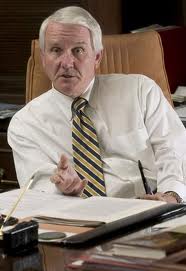
Judge Vinson Asks: What The Founders Would Think!
The name of this site, What Would The Founders Think? is more than just a rhetorical question or hard to type name for website. (Please feel free to use WWTFT.com if you like.) It seemed like a logical place to start fixing what has become an increasingly broken system. For the same reason, we refer to a shop manual to fix our car, we refer to the founding documents and the instructions left to us by the Founders to fix problems with our government.
In this metaphor, the presumption is that your car worked pretty well when it was new. Once it started racking up serious miles on the odometer, it needed some work to bring it back up to factory specs. There is no doubt that the system of government bequeathed to us by the Founders worked incredibly well for a very long time. Now it’s got some miles on it and needs to be brought back up to original specifications.

Judge Roger Vinson: credit AP
Enter Judge Roger Vinson of THE UNITED STATES DISTRICT COURT FOR THE NORTHERN DISTRICT OF FLORIDA PENSACOLA DIVISION as it says boldly across the top of his recent decision on the constitutionality of the health care bill known colloquially as “Obamacare”.
He begins his 78 page explanation by pointing out the real question is principally about our federalist system, and it raises very important issues regarding the constitutional role of the federal government and then leads right into a discussion of … The Federalist No. 51!  He was looking for advice from the Founders. The particular Founder in this instance is none other than the man credited as the very “father of the Constitution” – James Madison himself.
If men were angels, no government would be necessary. If angels were to govern men, neither external nor internal controls on government would be necessary. In framing a government which is to be administered by men over men, the great difficulty lies in this: you must first enable the government to control the governed; and in the next place oblige it to control itself.
The judge points out that to solve this “great difficulty” they created a central government of “few and defined” powers – only those expressly delegated to it. This was balanced against State governments with “numerous and indefinite” powers.
Judge Vinson also references Federalist No. 45 and the legislative powers “granted” to Congress. Government’s power is delegated to it by the people, not the other way around.
He concludes his introductory discussion of the limits of government power by pointing out that the powers granted to the Federal Government are in fact few and defined and that the 10th Amendment reaffirms that fact:
The powers not delegated to the United States by the Constitution, nor prohibited by it to the States, are reserved to the States respectively, or to the people.
Judge Vinson understands,
Over two centuries later, this delicate balancing act continues. Rather than being the mere historic relic of a bygone era, the principle behind a central government with limited power has “never been more relevant than in this day, when accretion, if not actual accession, of power to the federal government seems not only unavoidable, but even expedient.†Brzonkala v. Virginia Polytechnic Institute
The rest of the judge’s ruling is packed full of constitutional as well as historical references on the intentions of the nation’s Founders, including John Marshall, the longest serving Chief Justice of the Supreme Court. It is surprisingly accessible and well worth reading. In formulating his ruling he obviously asked our favorite question: What Would The Founders Think?
 The posts are coming!
The posts are coming!


6 comments
Makes me proud to live in Pensacola, Florida USA
[Reply]
Martin Reply:
February 3rd, 2011 at 8:14 pm
You should be! (At least you’re not in the 9th Circuit Court district!)
[Reply]
Thank God the case wasn’t brought before the 9th Circuit.
[Reply]
Martin Reply:
February 3rd, 2011 at 8:14 pm
Amen to that!
[Reply]
I am glad you decided to comment on this issue. I have begun reading Judge Vinson’s 78 page document and find that it is time well spent. I also appreciate seeing his picture.
[Reply]
Martin Reply:
February 3rd, 2011 at 8:13 pm
Hi Quinn, nice to see you here. Thanks! I’m glad you are finding the ruling as interesting as I did.
[Reply]
Leave a Comment